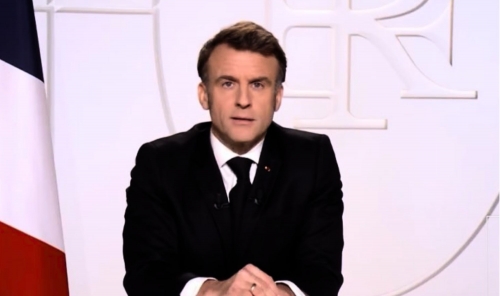Europe at a Turning Point in History, Warns French President Emmanuel Macron
TDT | Manama
Email : editor@newsofbahrain.com
As European Union leaders gather in Brussels for a special council on defense, France's President Emmanuel Macron has issued a stark warning, describing Europe as being at a “turning point in history.” The summit, which began Thursday, will focus on strengthening defense capabilities and providing further support to Ukraine, following recent developments in the conflict with Russia and tensions between Europe and the United States.
The ongoing war in Ukraine, now entering its third year since Russia’s full-scale invasion, has raised concerns in Europe about the continent's security, especially with US President Donald Trump’s announcement earlier this week to suspend aid to Ukraine. Ukrainian President Volodymyr Zelensky has been invited to the summit to participate in discussions.
In response to the growing uncertainty, President Macron emphasized that France was open to discussing extending the protection offered by its nuclear arsenal to its European partners. This comes after a call by Friedrich Merz, expected to become Germany's next chancellor, to explore further nuclear sharing arrangements among European nations.
European leaders have expressed alarm over the evolving security situation, with European Commission chief Ursula von der Leyen describing Europe as facing a "clear and present danger" on a scale not seen in recent history. European Council President António Costa labeled the current moment as a "defining moment for Ukraine and European security."
Von der Leyen, in a letter to European leaders, urged the continent to “meet the moment” by mobilizing its industrial and productive power to focus on security needs. On Monday, she unveiled the unprecedented defense initiative known as ReArm Europe, which aims to significantly increase Europe’s defense spending and improve its self-sufficiency. The proposals include measures to allow countries to raise national deficit levels to fund defense investments, loans for defense-related projects, and the reallocation of funds from cohesion programs to military expenditures. According to von der Leyen, the plan could unlock up to €800bn ($860bn) for defense.
The proposal has garnered broad support from many European leaders, with Polish Prime Minister Donald Tusk calling it a “fundamental shift.” Lithuanian President Gitanas Nauseda emphasized that the summit would determine whether Europe could move beyond mere debate and take decisive action on defense matters.
However, dissent is expected from leaders in countries with more favorable relations with Russia. Slovakian Prime Minister Robert Fico has criticized the EU's "peace through strength" approach, calling it “unrealistic.” Hungary’s Viktor Orban has also voiced opposition, demanding that Ukraine not be mentioned in any written conclusions of the summit. Orban, who has previously blocked EU aid to Ukraine, expressed concern over a "strategic divide" between Europe and the United States, with some leaders seeking to prolong the war in Ukraine while others push for an end to the conflict.
Meanwhile, UK Defence Secretary John Healey is in Washington for talks with his US counterpart Pete Hegseth to address the US decision to pause intelligence sharing with Ukraine. The UK is working to bridge the transatlantic rift and explore potential paths toward a peace plan for Ukraine.
To foster unity ahead of the summit, Macron invited Orban to a dinner in Paris on Wednesday evening, where the two leaders discussed European security. In a televised address to the nation, Macron stressed that Europe must be prepared to defend itself if the US is no longer willing to provide support. He also noted that the future of Europe cannot be tied solely to Washington or Moscow. “We have to be united and determined to protect ourselves,” he said.
Next week, Macron will hold a meeting of European military chiefs in Paris to continue discussions on strengthening Europe's defense capabilities. Macron concluded that the upcoming summit in Brussels would result in “decisive steps” to ensure that European countries are better prepared to defend themselves in the face of growing geopolitical uncertainties.
Related Posts

